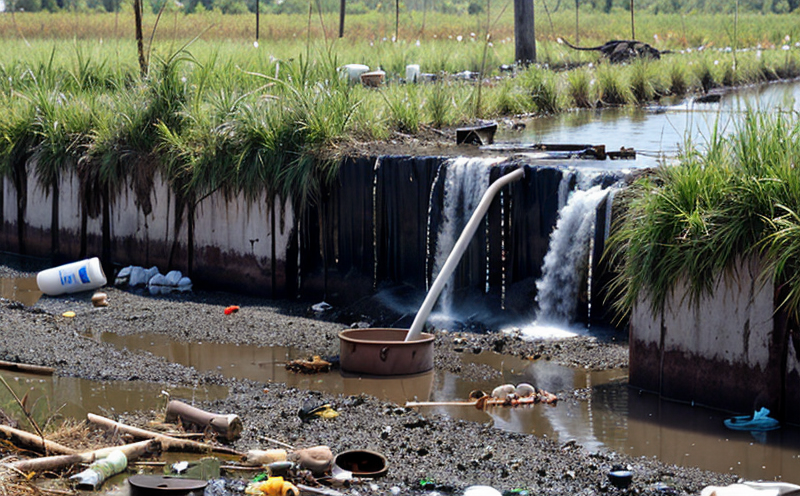BS EN 15936 TOC Pollutant Testing in Environmental Samples
The TOC analysis as per BS EN 15936 is a critical method used to quantify the total organic content present within environmental samples. This test is particularly relevant for understanding and managing pollution levels in water, soil, and air, which are key components of our environment.
The significance of this testing cannot be overstated as it helps regulatory bodies and industries alike ensure compliance with stringent international standards designed to protect public health and the environment. By measuring TOC in environmental samples, we can identify sources of contamination and assess the effectiveness of pollution control measures.
Our laboratory follows the prescribed procedures outlined in BS EN 15936 for accurate measurement of TOC. This includes rigorous sample preparation techniques that ensure minimal interference from other chemical species present in the matrix. Once prepared, the samples are analyzed using advanced ICP-MS and GC-MS instrumentation to provide precise measurements.
The results from these analyses help us determine the total organic carbon content, which is a key indicator of pollution levels. This data can then be used by stakeholders ranging from government agencies to private enterprises to make informed decisions about environmental management strategies.
In addition to providing accurate and reliable TOC testing, our laboratory adheres strictly to the requirements set forth in BS EN 15936 ensuring that all tests are conducted under controlled conditions. This not only guarantees high-quality results but also ensures that they can be trusted by regulatory authorities around the world.
The importance of this type of analysis cannot be understated, especially when considering its role in environmental protection and sustainability efforts. By leveraging advanced technology and adhering to international standards like BS EN 15936, we are able to offer a service that is not only accurate but also meets the highest levels of quality assurance.
For those looking into this area further or interested in how our services can benefit their operations, it’s important to understand that TOC testing plays an integral role in monitoring pollution sources and assessing treatment effectiveness. Whether you're part of a regulatory body tasked with enforcing environmental regulations or an industrial entity seeking to minimize its ecological footprint, understanding the intricacies of TOC analysis through BS EN 15936 is essential.
Our team of experts can guide you through every step of this process—from initial sample collection and preparation right up until final report generation. With years of experience in environmental testing, we bring unparalleled expertise to ensure that each project receives the attention it deserves. Our goal is always to provide clear insights into your specific situation so you have all the information needed for informed decision-making.
By choosing our laboratory, you gain access to cutting-edge technology and methodologies while benefiting from our deep understanding of environmental pollutants and their impacts on ecosystems worldwide. Let us help you navigate these challenges with confidence as we work together towards sustainable solutions.
- International Recognition: We are accredited to perform TOC testing according to BS EN 15936, ensuring that our results meet the highest international standards.
- Advanced Instrumentation: Our state-of-the-art ICP-MS and GC-MS equipment provides precise measurements for accurate analysis of TOC content in environmental samples.
- Strict Compliance: We adhere rigorously to all relevant regulations, including BS EN 15936, guaranteeing that every test is conducted under controlled conditions.
- Detailed Reporting: Our comprehensive reports provide detailed insights into the TOC content of your samples, helping you make informed decisions about environmental management strategies.
- Expertise and Experience: With years of experience in environmental testing, our team brings unparalleled expertise to ensure that each project receives the attention it deserves.
- Client Satisfaction: We prioritize customer satisfaction by providing clear insights into your specific situation so you have all the information needed for informed decision-making.
International Acceptance and Recognition
The TOC testing method as per BS EN 15936 is widely recognized across various sectors, including environmental management, water treatment plants, manufacturing industries, and more. This standard ensures consistency in methodology and accuracy of results worldwide.
Regulatory bodies often require compliance with such standards to ensure that tests conducted within their jurisdiction meet international benchmarks for reliability and precision. By adhering to BS EN 15936, our laboratory guarantees that the data generated from TOC testing can be trusted by both domestic and foreign entities alike.
The widespread adoption of this standard reflects its importance in various fields where accurate measurement of organic compounds is crucial. Water treatment plants frequently use it to monitor the quality of treated water before release into natural bodies of water, ensuring that harmful pollutants are kept at safe levels. In manufacturing facilities, adherence to BS EN 15936 helps companies maintain strict control over their processes by identifying potential sources of contamination early on.
Furthermore, many research institutions rely on this standard when conducting studies related to environmental science or toxicology because it provides consistent results that can be replicated anywhere globally. This consistency is vital for cross-border collaborations and international conferences discussing global environmental issues like climate change.
In summary, the broad acceptance and recognition of BS EN 15936 underscore its value as a reliable tool for assessing TOC in diverse applications. Its widespread use across multiple industries highlights its versatility and adaptability to meet specific needs while maintaining high standards consistently.





